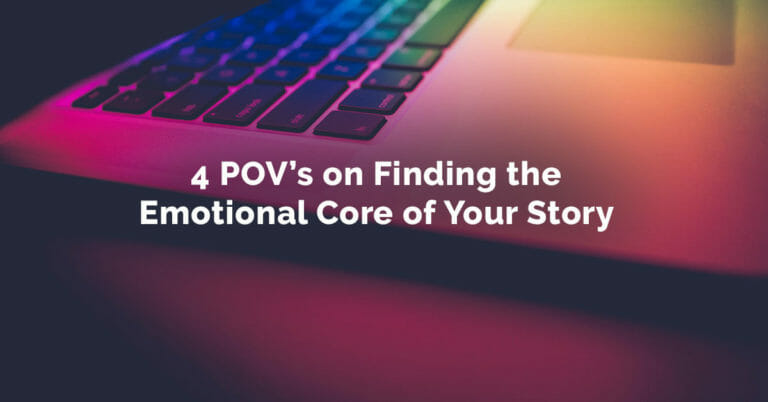By Rebecca Norris · November 6, 2018

This guide will take you through the process of finding the emotional core of your story, which will help hook your audience into the themes and messaging in your script. The following videos on TSL 360 will provide four different perspectives on story, from a screenwriter, writing professor, studio executive/story consultant, and a filmmaker.
If you don’t already have a TSL 360 membership, be sure to join TSL 360 for a FREE 3-day trial membership! TSL 360 is the LARGEST screenwriting education content library where you can learn from the best in the biz, featuring dozens of masterclasses, deep-dive interviews and lectures from Academy Award-winning screenwriters, Emmy-winning TV writers, producers, agents, major studio executives – all in one place.
What you’ll learn:
Ready to dive in? Sign up for your TSL 360 membership, and then let’s get started:

Meg LeFauve was nominated for a Best Screenplay Oscar for the Pixar blockbuster Inside Out, and also wrote Pixar’s The Good Dinosaur. She’s currently writing the animated film My Father’s Dragon for Netflix, and she previously wrote on the upcoming Marvel film Captain Marvel.
Meg began her film career as a producer and president of Egg Pictures, Jodie Foster’s production company. During that time, she produced projects that were nominated for an Emmy, a Golden Globe, and won a Peabody Award and an Independent Spirit Award. Meg teaches at AFI and the UCLA Graduate Producer’s Program, and also mentors at many writing labs, including CineStory, Sundance, and Meryl Streep’s lab for female screenwriters over 40, The Writers Lab.
In Meg’s interview on TSL 360, she talks about how getting clear on her goals helped her take the steps necessary to write for Pixar, what to look for when you’re receiving notes, and how to tap into the underlying emotion/theme of your script.
11:22-13:20 “So a lot of people walk up to me and say, ‘I’ve written a script.’ Well, OK, you’ve learned that much. Write ten. And rewrite each one at least three times. The rewriting is the writing… getting notes, that whole process. Your brain has to learn how to do that. In terms of that, you’re really listening for the note under the note. People’s brains will immediately fill in what you have left out. And they’ll fill it in with themselves, their life experiences, and their themes.
So I always listen for what they don’t get, what’s the problem, what they don’t hear, what aren’t they receiving or understanding from what I’m putting out. But their ‘how to fix it’ is just their brain illuminating the problem… and if we can get it [the theme] deep enough, it will become all of ours, because it’s all of humanity… if you can keep digging, down into ‘what is this about,’ then it should reflect all of us. All of us should be able to start throwing in, because we’ve had that experience as human beings.
For example, accepting sadness, and what does sadness bring that’s positive? That’s something we can all start to relate to, and emotionally contribute to. But if your theme is still intellectual, then you haven’t got it yet. Sometimes when I’m working with writers, they’ll tell me, ‘well, it’s about ‘revenge is bad,’ or whatever, and intellectually, I’m like, OK, but I don’t feel anything when you say that.”
In Meg’s interview: Learn what it’s like to work in Pixar’s “Brain Trust” room, and how Meg channels the emotional themes the director is looking to explore into her scripts.

Mark Evan Schwartz is an Associate Professor of Screenwriting at Loyola Marymount University’s School of Film and Television in Los Angeles, and has credits on over a dozen produced feature films, television shows, and TV movies. Starting out as a production assistant for Francis Ford Coppola, he went on to become a story analyst for the David Geffen Company, Story Editor for Galactic Films MGM, and Head of Story and Development for Nelson Entertainment, the international distributor of When Harry Met Sally, The Princess Bride, and the Academy-Award winner The Last Emporer. Mark has conducted screenwriting seminars across the country, and is the author of HOW TO WRITE: A Screenplay (Bloomsbury Int’l Academic), currently out in its second edition.
In his interview on TSL 360, Mark discusses the techniques he teaches his screenwriting students, his approach toward screenplay structure and emotion/sense memory, and his adventures when breaking into Hollywood.
16:53-18:04 “Certainly sense memory is crucial to great writing. But also in terms of pursuing your own personal objectives… drawing on your own experience, recalling events in your own life, for better or worse, sometimes happiness, sometimes sadness. Sometimes comic, sometimes tragic. Surrendering yourself to the full emotion of how that impacted you… and through the acknowledgment of that, and addressing the character within your story first. First, you might address that character as yourself, then beginning to distance yourself. But my belief is that to build a great character, you have to begin with what perhaps your own emotional reaction was to the given situation.”

Jen Grisanti is an acclaimed Story/Career Consultant, International Speaker, and Writing Instructor for Writers on the Verge at NBC. Jen got her start as an executive for Aaron Spelling before moving to CBS/Paramount, where she staffed numerous shows and worked directly with top executive producers and writers. Jen started her own company, Jen Grisanti Consulting, Inc., in 2008 to share the value she has learned over the years with up-and-coming writers to help them attain their dreams. She is also the author of Story Line: Finding Gold in Your Life Story, TV Writing Tool Kit: How to Write a Script That Sells, and her upcoming book, Change Your Story, Change Your Life.
In her Master Class on TSL 360, Jen emphasizes knowing what the purpose of story is and being clear on why you’re telling your particular story. After all, if you’re not clear on what your message is, the audience won’t be either!
1:24-1:55 “One of the main points of story is to make us feel. This is a huge thing when you are constructing your story to really think about. What are story tools you can utilize that will emotionally connect your audience with your message, and what you’re trying to say with your story?”
13:47-14:20 “Now the objective of story, we know, is to make the audience feel. The story is all about emotion… I really want you to think about your intention when you come up with your concept—of what is the objective of telling this specific story? What is your message, what do you want to leave your audience with, what are you trying to say?”
In Jen’s Master Class: Discover the steps of writing a logline that will hook your audience in emotionally and help to streamline your concept.

Jesse Atlas is a quickly-emerging writer-director, known for crafting high-concept, emotionally grounded genre thrillers, and for working in the short form space. Jesse’s short film, the sci-fi love story Record/Play, exploded onto the festival circuit with screenings at Sundance, LA Film Festival, HBO/Urbanworld, and Fantastic Fest, among many others. The film was quickly snatched up as a feature adaptation at Universal’s Focus Features, with Atlas Entertainment producing. Jesse has two new films about to hit festivals: Kinesthesia, a supernatural short featuring the biggest names from Dancing with the Stars, and Angels in Exile, a feature documentary produced and narrated by Charlize Theron, about homeless youth in Durban, South Africa.
In his interview on TSL 360, Jesse talks about his humble beginnings in off-off-off-off-off Broadway theater, and how he expands the narratives of his short form pieces into feature films.
19:40-20:32 “There’s always more in the middle to extrapolate on… I’ve gone through this process a few times, and I always feel that the answer is not about ‘what else can we throw at them’… is it expanding the villain, is it set in LA and they need to get out of LA and go to Africa? It’s never about that. It’s always about taking whatever’s on the table and just pulling it, pulling it deeper. Pulling yourself deeper into the story, pulling your characters deeper… living in the middle.”
In Jesse’s interview: Hear about Jesse’s path into filmmaking and success on the festival circuit, and how he uses the art of short form to springboard to larger projects.

 Rebecca Norris is a producer, writer, and filmmaker with her production company, Freebird Entertainment. Her recent award-winning feature film, Cloudy With a Chance of Sunshine, has been distributed on Amazon Streaming and DVD. Rebecca is also a script analyst and consultant who has read for many companies, including Sundance, ScreenCraft, Bluecat, and the International Emmys, as well as her own script consultancy, Script Authority. Rebecca blogs for Screencraft, The Script Lab, WeScreenplay and Script Magazine, exploring the film writing and production process and encouraging writers to produce their own work. Follow Rebecca’s posts on Twitter at @beckaroohoo!
Rebecca Norris is a producer, writer, and filmmaker with her production company, Freebird Entertainment. Her recent award-winning feature film, Cloudy With a Chance of Sunshine, has been distributed on Amazon Streaming and DVD. Rebecca is also a script analyst and consultant who has read for many companies, including Sundance, ScreenCraft, Bluecat, and the International Emmys, as well as her own script consultancy, Script Authority. Rebecca blogs for Screencraft, The Script Lab, WeScreenplay and Script Magazine, exploring the film writing and production process and encouraging writers to produce their own work. Follow Rebecca’s posts on Twitter at @beckaroohoo!
For all the latest from The Script Lab, be sure to follow us on Twitter, Facebook, and Instagram.